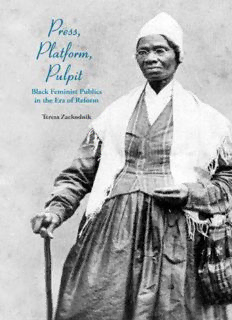
Press, Platform, Pulpit: Black Feminist Publics in the Era of Reform PDF
Preview Press, Platform, Pulpit: Black Feminist Publics in the Era of Reform
Press, Platform, Pulpit Press, Platform, Pulpit Black Feminist Publics in the Era of Reform Teresa Zackodnik The University of Tennessee Press / Knoxville [ Copyright © 2011 by The University of Tennessee Press / Knoxville. All Rights Reserved. Manufactured in the United States of America. First Edition. Library of Congress Cataloging-in-Publication Data Zackodnik, Teresa C. Press, platform, pulpit: Black feminist publics in the era of reform / Teresa Zackodnik. p. cm. Includes bibliographical references and index. ISBN-13: 978-1-57233-826-5 (alk. paper) ISBN-10: 1-57233-826-1 (alk. paper) 1. Feminism—United States—History—19th century. 2. African American feminists—History—19th century. 3. African American social reformers—History—19th century. 4. African American clergy—History—19th century. I. Title. HQ1423.Z33 2011 305.48'896073009034—dc23 2011021560 For Ailsa Brazeau, whose hero is Rosa Parks Contents Acknowledgments ix Introduction: Going Public: African American Feminism in the Era of Reform xiii Chapter 1. Soul Winners and Sanctified Sisters: Nineteenth-Century African American Preaching Women 1 Chapter 2. Internationalizing Black Feminisms: Ellen Craft, Sarah Parker Remond, and American Slavery in the British Isles and Ireland 49 Chapter 3. “I don’t know how you will feel when I get through”: Racial Difference, Symbolic Value, and Sojourner Truth 93 Chapter 4. The Platform, the Pamphlet, and the Press: Ida B. Wells’s Pedagogy of American Lynching 131 Chapter 5. “We must be up and doing”: Feminist Black Nationalism in the Press 167 Conclusion: Feminist Affiliations in a Divisive Climate: Anna Julia Cooper’s “Woman versus the Indian” 225 Notes 249 Works Cited 295 Index 319 Illustrations Following Page 123 Jarena Lee (1783–?) Amanda Berry Smith (1837–1915) Sarah Parker Remond (1826–1892) Sojourner Truth (ca. 1797–1883) Ida B. Wells (1862–1931) Mary Church Terrell (1863–1954) Mary Ann Shadd Cary (1823–1893) Victoria Earle Mathews (1861–1907) Fannie Barrier Williams (1855–1944) Josephine Silone Yates (1859–1912) Frances Harper (1825–1911) Anna Julia Cooper (1858–1964) Acknowledgments My seven-year-old daughter recently declared, though I need no reminding, that “an important history” is represented in this book. She’s right, of course. And I’m mindful that it marks, inevitably, only a partial sense of the aston- ishing work these women undertook, just as I’m mindful that there were so many more women laboring for black feminist causes at this time about whom we know little or nothing. Yet learning what I have been able to about the work of early black feminists and their context has been a fascinating process and a rich pleasure for which I am grateful; I can’t imagine any other work being as interesting or as sustaining over a number of years as this was. Like any book, this one owes many thanks and carries many debts, the largest of which is to those African American women who risked so much to keep “the colored woman” at the center of reform debates in the nineteenth century. Their work was essential to the well being of black communities, spe- cifically, and of the country more generally, in ways that reach beyond their own moment and into ours. We would know little of their labors were it not for the recovery work undertaken over the past several decades, scholarship that paves the way for and enables further studies like this one that begin to question the historiographies created from that recovered material and begin to look anew at figures we have known for some time alongside those who are new to us. Without the formidable scholarship on the black church, aboli- tion, woman’s rights, suffrage, anti-lynching, and the black press, studies like this are not possible. This book and the archival research undertaken for it were funded by a research grant from the Social Sciences and Humanities Research Council of Canada (SSHRC). SSHRC funded the research assistance of several people who made the project possible, and I am grateful as well to the Department of English and Film Studies at the University of Alberta for also providing essential research assistance for this project. For their research skills, I thank Jackie Baker, Michael Borshuk, Mridula Chakraborty, Karen Engle, Heather Kitteringham, Ross Langager, Christie Schultz, and Vivian Zenari. Finally,
Description: